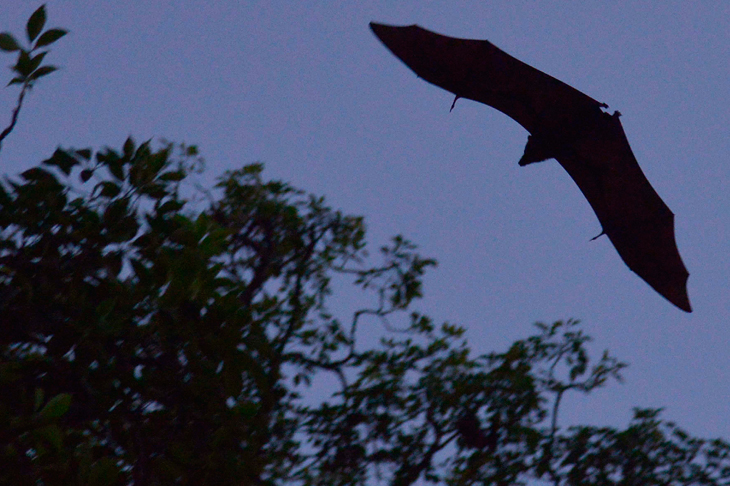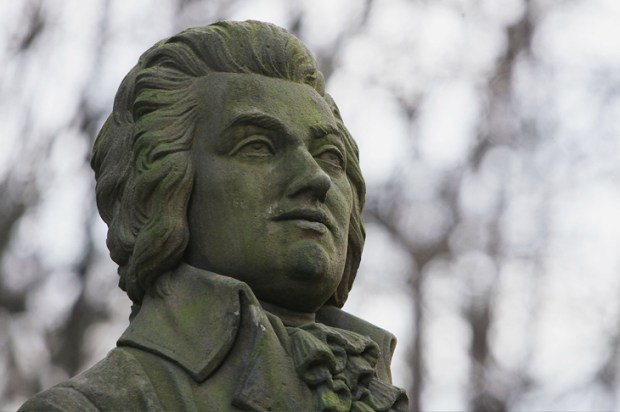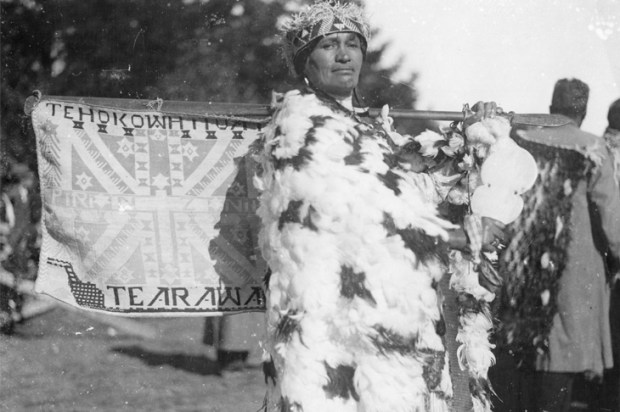When I was a small boy growing up in England, the expression ‘ to have bats in the belfry’ was probably the most polite expression generally used to cover anything from extreme eccentricity to being daft as a brush.
Regrettably ‘to have pink batts in the attic’ although audibly similar lacks genuine resonance and refers in any case only to the somewhat unbalanced actions of a recent government rather than to any single member of society. What I wish to propose nonetheless is that bats and a marked shortage of sanity do warrant an ongoing connection for a great many of those who currently live in Sydney – with the exception of devout greenies who probably welcome the out-of-control presence of fruit bats in their personal preserves.
When I first came to Sydney to live, twenty odd years ago, almost the only fruit bats I recall in Sydney itself were those which appeared at dusk flying south down the Pacific Highway and turning sharp left precisely at the block of units in Neutral Bay then occupied by my betrothed who had recently finished working on the choreography and musical arrangements for the film Babe. All ancient history now. The bats were simply on their way to Sydney’s Botanic Gardens of course. Indeed, the only other examples I encountered regularly were those hanging upside down and vomiting vociferously in the nearby Sydney suburb of Balmoral where contributors to The Spectator Australia are known to assemble for the occasional prolonged lunch – with no regurgitations at all – at The Bathers’ Pavilion.
Today however the presence of fruit bats and their nocturnal regurgitations more or less blanket Sydney proper from the Northern Beaches to Manly and Greenwich and from the Blue Mountains to the city centre. Indeed, is anywhere in Sydney today, other than entirely treeless areas, wholly free from their presence?
In theory I have nothing but liking for ‘flying foxes’ but do certainly fear that outbreaks of serious disease may occur shortly when their numbers finally reach plague proportions.
Few post-modern children will have much acquaintance with the Old Testament of course, but so-called biblical plagues were once a regular reality known in many quarters of our globe. Indeed, one of the very first photographs of Australia I saw as a child featured a great plague of locusts and during my years here plagues of mice, mosquitoes, fire ants and cane toads have similarly made their presence felt. Biblical plagues were often associated with human wrongdoing but who – other than Tony Abbott – is accused of being always in the wrong these days in current Australia?
Miranda Devine, like her late father Frank, tries to remind us consistently in her writings and broadcasts that moral codes existed in society long before political correctness and similar ersatz substitutes even began to appear and that the notion of truth was once referred to exclusively in the singular. Yet today one of Australia’s pre-eminent universities – Sydney – publicly decries the whole notion of truth. A billboard message for that university – which is an apparent part of a ‘branding campaign’ – enjoins students to ‘unlearn’ most of the beliefs they bring to campus, including more or less anything to do with Christianity.
Imagine this: your son or daughter is brought up in an intelligent and caring Christian household but is then required to abandon the values of the entire family when entering university. Can such an outcome possibly be looked on anywhere as ‘right’? An excellent and clearly argued article of extraordinary length by Greg Sheridan dignifies the Weekend Australian of August 26/27 under the rubric IS GOD DEAD? I have not seen an article of such length and complexity in a general newspaper since the same author wrote with similar authority on his utter disillusionment with multiculturalism a number of years ago (2/4/11). Foreseeably he was compared then by noted Australian academic Robert Manne to notorious former Nazi Julius Streicher. The fight has truly been on for years here not just for Australia’s soul but for its ongoing sanity.
In the meantime one of my oldest friends Fr. Paul Stenhouse, editor of Australia’s Catholic magazine Annals, has kindly asked me to cast an eye over the finest article I have ever read on the subject of 13th century saint Thomas Aquinas. Who, other than Catholics, even knows who that great man was today let alone acknowledges his vast contribution to Western thought and civilisation? If we were to drop the saintly prefix how many current Australians would have even a clue who he was? A ruckman for Geelong perhaps?
As Brendan O’Neill writes in a lead article in the last Speccie, university life in Britain now mirrors the unfunny joke that university life in Australia has sadly become. When my late father Roland Ainsworth Auty received a First Class Honours degree in English at University College, London, 90-odd years ago, genuine scholarship was surely still involved. Even as an undergraduate he began revising dictionaries and ended his professional life as a senior reader for the Complete Oxford English Dictionary to which he contributed some 26,000 original entries. His immensely heavy 13 volume edition still follows me wherever I go. I would describe my late father as a fine scholar, however, rather than any kind of intellectual because he lacked an ability to move effortlessly between disciplines. He also had a lifelong love of the erratic values and personnel of Bloomsbury – a fatal aberration I certainly don’t share.
Post-modernism has turned intellectual life in the Western world into a sad caricature of its former glories and one in which the word belfry itself may soon attract only a vacant stare. What was the joyful message that church bells once carried?
Got something to add? Join the discussion and comment below.
Get 10 issues for just $10
Subscribe to The Spectator Australia today for the next 10 magazine issues, plus full online access, for just $10.
You might disagree with half of it, but you’ll enjoy reading all of it. Try your first month for free, then just $2 a week for the remainder of your first year.















Comments
Don't miss out
Join the conversation with other Spectator Australia readers. Subscribe to leave a comment.
SUBSCRIBEAlready a subscriber? Log in